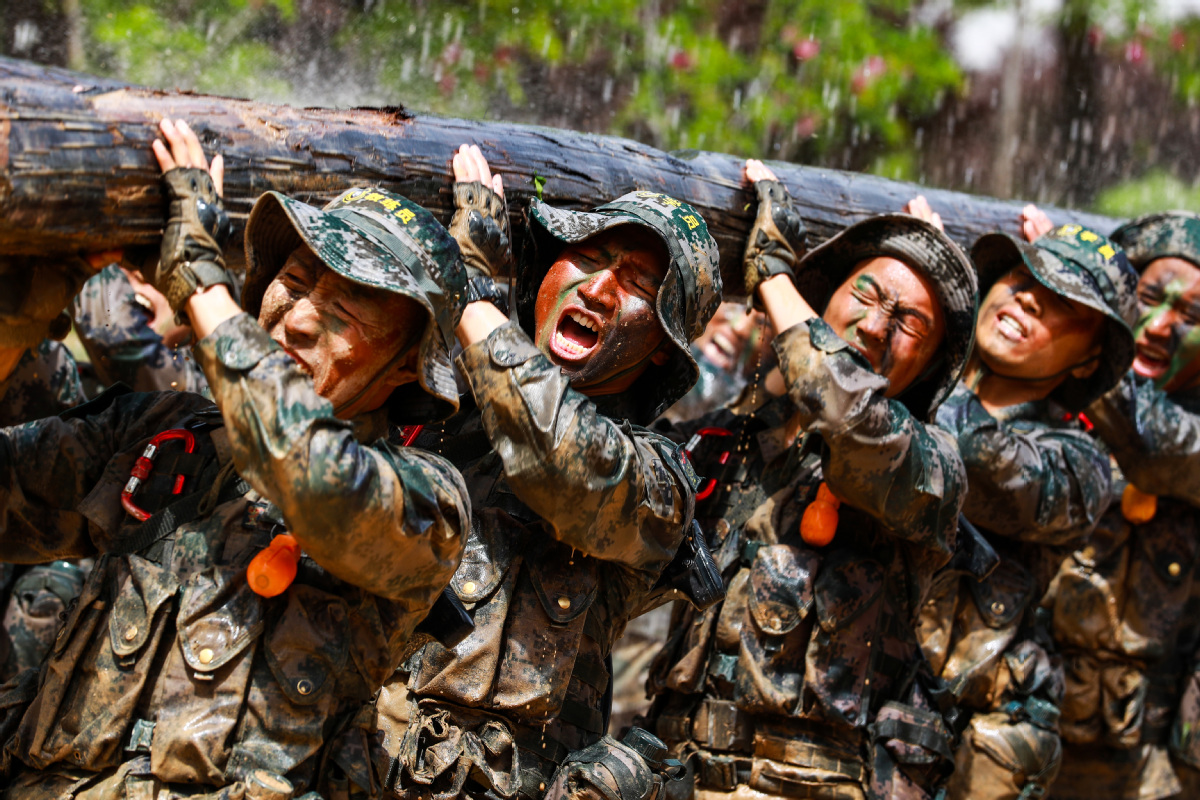
A People's Liberation Army unit renowned for historic victories has vowed to uphold its loyalty to the Communist Party of China and the people by honing its combat capabilities and readiness.
On the morning of June 30, a day before the centenary of the founding of CPC was celebrated, all the members of the First Company of the PLA's 83rd Army Group-fully armed and neatly arrayed-solemnly pledged the Party admission oath in front of the Party flag to celebrate the anniversary.
Captain Hu Guanlei, the company's commander, said the strong leadership of the Party had led generations of the company's soldiers to victory in hundreds of battles, so they celebrated the Party's centenary militarily.
"It is also to make all members of the company remember the loyalty and fighting qualities instilled in our blood," he said.
The company-often referred to as the "Red First Company"-started as a peasant self-defense force that was integrated into the Red Army. It pledged the first Party admission oath in the history of the Chinese armed forces 94 years ago.
On Oct 15, 1927, Mao Zedong admitted six soldiers from the company into the CPC and set up a Party branch-the first company-level Party branch in the army.
The establishment of what was dubbed the "Party branch built on a company" was historically significant because it kicked off the successful practice of building a new type of people's army with a primary political nature, contributing to the final victory of the revolution.
The company has fought in more than 300 battles and been awarded first-class merit honors four times, second-class merits 10 times and third-class merits 14 times. It has also received five honorary titles, including "Hundred Battles, Hundred Victories" in 1942, "Valiant Company" in 1948 and "Model Party Branch" in 1991.
Since the 18th CPC National Congress in 2012, the company has completed numerous major missions, including international peacekeeping, rescue and disaster relief, taking part in international military competitions and joint exercises, and has been recognized as an advanced PLA unit.
Soldiers from the company said its Party branch committee plays a strong role in maintaining its edge.
The seven-member committee, with company instructor Captain Zheng Jiwen as secretary and Hu as deputy secretary, takes the lead in training.
Late last year, the company was equipped with new combat vehicles. No one was familiar with the new equipment, and the committee members worked overtime to master the vehicles before developing a training program.
The Party branch has also set very strict requirements for its committee members: they have to achieve "excellence" in all training subjects and win first place in competitions just to "pass". In difficult subjects, they have to train to their limit and their command skills must prove useful in combat drills.
"We have to master all important and difficult subjects first so that we can be convincing enough to demonstrate, teach and lead our company soldiers," said Sergeant Ke Changshui, a member of the committee.
"This is an effective way to increase cohesion, solidarity and combat power."
Efficient training
In 2017, the Chinese military began undergoing a series of reforms. To adapt to modern warfare, the company also formulated new development plans.
It was the first unit in its brigade to set up a special room dedicated to combat research. The room has a database of tactical and combat-related information and also displays models of major military equipment from home and abroad.
The company's officers and soldiers are divided into 13 warfare research groups to carry out regular studies on equipment, cases, tactics and strategies, and training methods, and discuss military dynamics, the use of firepower and cutting-edge technologies.
Sergeant Miao Hui, a squad leader, says "innovate or perish" is his motto. In the past, when the company trained for shooting at night, at least 10 soldiers needed to sit under targets to light them up with flashlights. Although the company had access to other equipment, its controls were very cumbersome, Miao said.
Miao bought wires and remote control devices and started experimenting. Without any knowledge of electrical circuits, he studied all the books he could find and kept pestering the company's technicians to learn circuit principles.
After repeated failures, he managed to design a control circuit for 10 spotlights, allowing the commander to control them remotely and vary the length of time the targets are illuminated, greatly improving training efficiency. This innovation helped the company improve its night shooting accuracy by 20 percent.
That spirit of innovation has, in recent years, encouraged the company to explore 13 new training methods, develop eight training aids, including a laser simulation calibration system, and produce five types of software.
"Old equipment is constantly being updated, so our training methods and equipment also need to catch up and our training ideas must also constantly innovate in order to keep up with the standard required of the army in the new era," Miao said.









